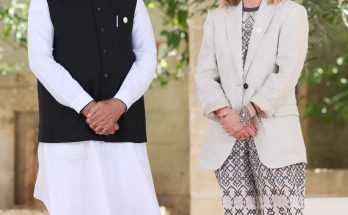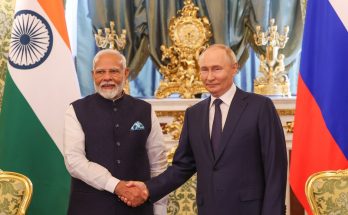
In the first high level in-person visit between India and Maldives since the COVID-19 pandemic broke out, Foreign Secretary Harshvardhan Shringla and Maldives Foreign Minister Abdulla Shahid signed four MoU’s including a $100 million grant by India to fund the Greater Male Connectivity Project. ”The MoUs are emblematic of our strong development partnership which is multi-faceted and designed to meet the specific requirements of the Government and people of Maldives,“ Mr Shringla remarked at an event which was attended by many senior Maldivian ministers.
India-Maldives partnership have scaled new heights under the presidency of Ibrahim Mohamed Solih whose administration has repeatedly reaffirmed its commitment to an “India-First Policy.” On its part, India has accorded highest priority to the Maldives under Prime Minister Modi’s Neighbourhood First initiative. This opened a new chapter in bilateral ties as the two countries, bound by long-standing civilizational ties, had drifted apart under the previous pro-China Abdulla Yameen administration.
“Foreign Secretary Shringla’s visit to the Maldives, soon after his visit to three European countries illustrate the rising importance of the island nation in India’s foreign policy calculus,” said Manish Chand, Editor-in-Chief, India Writes Network and India and the World magazine.
“Significantly, Mr Shringla’s visit took place soon after US Secretary of State Mike Pompeo’s visit to the Maldives, indicating possibilities of India-US cooperation with a view to constrain China’s growing influence in the Indian Ocean country,” he said.
Countering China

Re-establishment of democracy in the island nation under the changed administration has led to both countries engaging closely to maintain peace in the larger Indo-Pacific region. As India assertively embraces its maritime identity and actively participates in ensuring a free and open Indo-Pacific, the strategic importance of Maldives will only increase given its crucial geographic position. In fact, enhancing cooperation in the Indian Ocean Region, especially in the maritime security domain, has been a growing area of cooperation between the two countries. Mr. Shringla extended India’s support to the Maldives joining the Indian Ocean Regional Association. He also reiterated India’s support for Maldives presidency of the 2021 session of the United Nations General Assembly and expressed optimism for close collaboration between the two democracies in the UN.
Out of the four MoUs signed, two MoU’s were for High Impact Community Development Projects, an MoU on Cooperation in Sports and Youth Affairs and an MoU to fund the Greater Male Connectivity Project. The community development projects include the construction of an agricultural research centre in Hanimaadhoo and another to finance a component of the Drug Detoxification Centre to be built in Hulhudhoo. These projects are directly expected to benefit the communities and promote socio-economic welfare of the people. India has committed $500 million to implement the largest civilian infrastructure project— Greater Male Connectivity Project—which is one among the several large-scale projects being carried out in the Maldives by India. Currently, covering all loans and grant projects India’s total financial commitment to Maldives amounts to over $2 billion.
Primarily driven by tourism, the Maldivian economy was badly affected by the global travel restrictions induced by the pandemic and India came promptly to the rescue of the Maldives. India has provided $250 million financial assistance as concessional loan to the Maldives and donated 5.5 tonnes of essential medicines, helped in the evacuation of Maldivians from Wuhan during the early days of the pandemic and provided 580 tonnes of food aid. Furthermore, to revive the Maldives tourism, India announced an air travel bubble with it, the first of its kind in the neighbourhood which was well received by the Maldivian government.
China has also turned its attention towards the Maldives in recent years and has been a close development partner and lender. But this expanded engagement has saddled Male with around $1.4 billion debt to Beijing, fuelling fears of ‘debt trap diplomacy’. India’s increased engagement with the Maldives has come in the form of development cooperation, which includes “transparency; full participation and ownership of the host country; and competitive pricing,” in the words of Mr Shringla.
The sustained efforts from the Indian side to constantly build and sustain relations with this small island nation is illustrative of its importance to India’s larger geopolitical interests.





